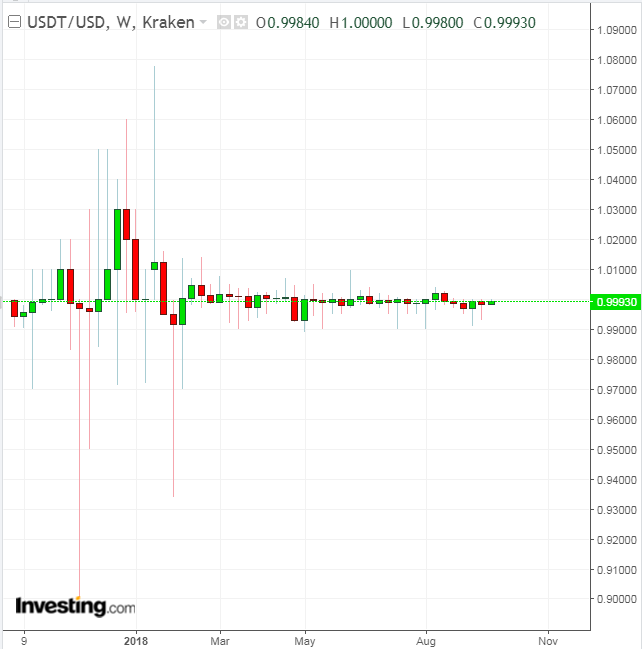Tether (USDT) is currently the eighth most traded cryptocurrency. But its popularity belies a growing array of concerns and controversy surrounding the stablecoin.

Invented in 2015, coins are issued by Tether Limited, which claims each token is pegged to the US dollar. This 'fixing' to the fiat currency has earned Tether the stablecoin designation. But its stability remains in question since Tether Limited has yet to produce an audit verifying these claims.
Additional problems for the alt-currency surfaced on September 17, when the underlying blockchain protocol on which Tether runs, Omni Layer, froze, halting Tether transactions. At that time Omni tweeted:
"We have identified the issue with a backend client used by our parsing engine that appears to have locked up/become non-responsive. We have restarted all applicable processes and are monitoring them while they verify & resync. This process should take ~ 2-3 hours to complete,”
Though the problem was identified relatively quickly, with the glitch fixed by the next day, it revealed that many exchanges were not running their own Omni Layer nodes, but rather relying on Omni itself to verify transactions. And since Omni operates on a Bitcoin transfer network, a number of market players believe the trade volume of Bitcoin from the 16th of September, to the 17th, was unusually low and can be pinned to this Tether glitch.
Lack Of Transparency, Unproven Reserves
Additional concerns regarding Tether persist as well. Critics have alleged that the Hong Kong-based crypto exchange Bitfinex, which has close ties to Tether, has been issuing more USDT than it has dollars in the bank, in order to drive up the price of Bitcoin. This underscores an industry-wide need to keep an eye on Tether's USDT pricing. Given its alleged peg, the coin has become a pivotal source of liquidity for the crypto markets. And indeed, it generally does trade around the $1 per coin level, but it has gone as low as $0.80 and as high as almost $1.10.
The BTC price manipulation claim, however, hasn't been substantiated. Indeed, a recent study from the University of Queensland Business School found that any impact of Tether on Bitcoin prices and trading volumes is temporary, with volume returning to normal within five days.
Notwithstanding, doubts about the digital currency continue. The token's lack of transparency regarding its reserves spurred the Singapore-based Digifinex exchange to last week announce it had replaced its stablecoin USDT platform with TrustToken's TrueUSD (TUSD). Digifinex has a daily trading volume of nearly $120 million and is among the top 20 global crypto exchanges according to CoinMarketCap.
Tether was created by Bitfinex, explains Chance Du, founder and general partner at Coefficient Ventures. It operates with low transparency she says, which means if it fails it can be very risky for the blockchain community.
“Currently, Tether is the most liquid and adoptable stablecoin in the market, and a better option for the majority when compared to fiat currency and bank regulations. I personally think the adoption of a stable coin is a key development of the crypto currency for massive adoption, however, if this kind of adoption goes into a stablecoin with huge risk, it can eventually become a big bomb in the blockchain industry.”
Though the dollars pegged to Tether's value are held in a designated bank account, Quoc Le, Managing Director of the QUANTA crypto exchange notes that Tether’s legitimacy will continue to be questioned as long as its USD backing cannot be verified.
Says Simon Harman, project head at Loki, a privacy network which will allow users to transact and communicate privately and anonymously over the internet:
“It’s unfortunate that Tether has become a staple of the industry, as it closely resembles the very financial systems that the early adopters of cryptocurrency set out to undermine. Better options for the store value in dollar terms exist, but the market effect it has gained means Tether isn't going anywhere until and if something goes very, very wrong.”
The relevance and role of stablecoins is also being questioned, given that one of the original tenets of the alt-currency asset class was to allow users to move away from centralized, fiat currencies. Still, the idea of stablecoins has been praised as the solution to crypto’s volatility problem, offering the potential to revolutionize crypto trading.
Todd Lemons, chairman of Veridium thinks the existance of stablecoins in the crypto market is important. He believes they're a critical component for moving the asset class into the mainstream. It's his view that the trillions of dollars worth of assets under management are not going to move into these particular markets without some assurance of stability.
"To make sure we create the stability the financial markets are expecting, the assets behind these so-called stable tokens need to be independently auditable in real-time and preferably should be backed by a diversified basket of assets, beyond just fiat currencies. For example, at Veridium, we have created a stable token, CARBON, that is backed by carbon credit assets, which are verifiable on internationally recognized registries, such as the IHS Markit Registry."
Others agree. Cameron and Tyler Winklevoss, who have famously tried to start a crypto ETF but haven't yet succeeded also announced the creation of a USD-pegged Ethereum token that aims to compete with USDT as the stablecoin of choice among Bitcoin traders.
Nevertheless, doubters persevere. Some crypto market analysts believe the best thing that could happen to the nascent "stablecoins" space is that it disappears now, before it gets any larger.
In all seriousness, I think the best thing that could happen to the nascent "Stablecoins" space is that it collapses now before it gets too big.
